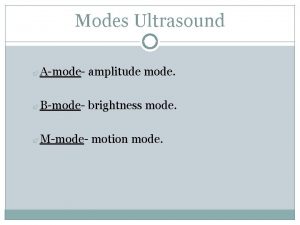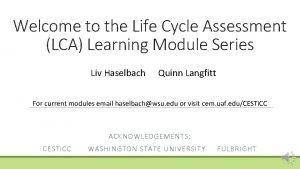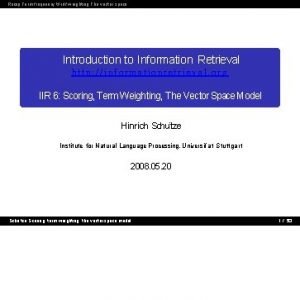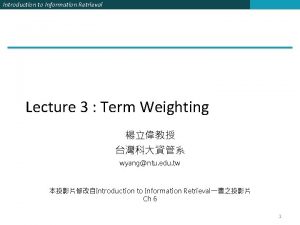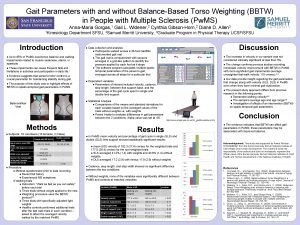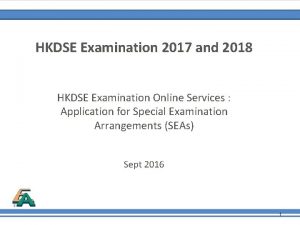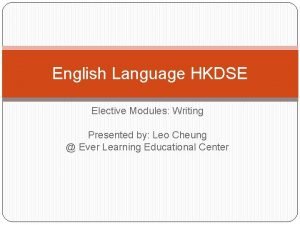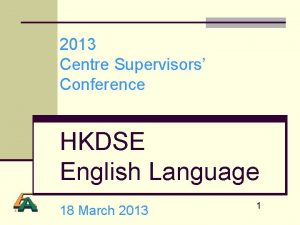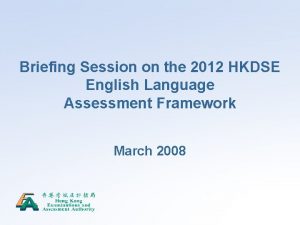HKDSE English Language Mode of assessment Component Weighting













- Slides: 13

HKDSE English Language

Mode of assessment Component Weighting Duration Paper 1 Reading Paper 2 Writing Paper 3 Listening & Integrated Skills Paper 4 Speaking 20% 25% 30% 1. 5 hours 2 hours 10% 20 minutes SBA (Part A & Part B) 15%

Paper 1 Reading (20%) • • 3 sections Part A (compulsory) Part B 1 (easier) Part B 2 (difficult) Choose either Part B 1 or Part B 2 • Part A + Part B 1 Highest: Level 4 • Part A + Part B 2 Highest: Level 5**

Paper 2 Writing (25%) • • 2 parts Part A (a short, guided task, about 200 words) Part B (longer, open-ended, about 400 words) 8 Questions (based on the 8 elective modules) 1. Sports Communication 2. Drama 3. Poems and Songs 4. Debating 5. Short Stories 6. Popular Culture 7. Workplace Communication 8. Social Issues

Paper 3 Listening & Integrated Skills (30%) • • 3 sections Part A (compulsory) Part B 1 (easier) Part B 2 (difficult) Choose either Part B 1 or Part B 2 • Part A + Part B 1 Highest: Level 4 • Part A + Part B 2 Highest: Level 5**

Paper 4 Speaking (10%) • • 2 parts Part A (Group Interaction) Preparation: 10 minutes Discussion: 8 minutes • Part B (Individual Response) • 1 minute

SBA (15%) • • 2 parts Part A (7. 5%) Read 1 book OR watch 1 film Group interaction OR Individual presentation • Part B (7. 5%) • Reflect on what you have learnt in 1 elective module • Group interaction OR Individual presentation

Assessment objectives Reading To assess the ability of candidates to : • understand interpret the purpose and meaning of a broad range of texts • identify the main theme and key details of a broad range of texts • identify the contextual meaning of words and phrases • interpret the tone and mood of a writer • distinguish and evaluate views, attitudes or arguments in fairly complex texts • understand the use of a range of language features in fairly complex texts • interpret, analyze, select and organize ideas and information from various sources

Writing To assess the ability of candidates to : • write texts for different contexts, audiences and purposes with relevant content and adequate supporting details • convey meaning using varied vocabulary, linguistic devices and language patterns appropriately and accurately • plan and produce coherent and structured texts with ideas effectively presented and developed • write texts using appropriate tone, style and register and the salient features of different genres • draft and revise written texts

Listening To assess the ability of candidates to : • understand interpret the purpose and meaning of a range of spoken texts • identify the key details of a range of spoken texts • interpret speakers’ feelings, views attitudes and intentions • understand speakers with a range of accents and language varieties in speech delivered at a moderate pace • understand the use of a range of language features in fairly complex spoken texts

Speaking To assess the ability of candidates to : • express information and ideas with suitable elaboration • convey meaning using a range of vocabulary and language patterns appropriate to the context, purpose and audience • establish and maintain relationships / spoken exchanges using formulaic expressions and appropriate communication strategies • produce coherent and structured speeches with ideas effectively / clearly presented and developed • pronounce words clearly and accurately • use appropriate pace, volume, intonation, stress, eye contact and gesture to support effective communication

Papers in junior and senior forms S. 1 -3 S. 4 -6 Reading & Grammar Reading (20%) Writing & Vocabulary Writing (25%) Listening & Integrated Skills (30%) Speaking (10%) SBA (15%)

Tips to enhance your English language skills: • • Read more Write more Listen more Speak more
 Hkdse english paper weighting
Hkdse english paper weighting A-mode ultrasound image
A-mode ultrasound image English dse weighting
English dse weighting Eduqas english literature past papers
Eduqas english literature past papers English language component 2
English language component 2 Eduqas narrative writing titles
Eduqas narrative writing titles Normalization and weighting in lca
Normalization and weighting in lca Instance weighting for domain adaptation in nlp
Instance weighting for domain adaptation in nlp The weighting game download
The weighting game download Log frequency weighting
Log frequency weighting Information retrieval
Information retrieval Oer radiation
Oer radiation Balance based torso weighting
Balance based torso weighting Focus mode and diffuse mode
Focus mode and diffuse mode

